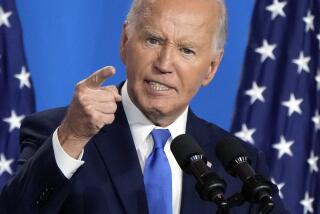NEWS ANALYSIS : Connecticut May Indicate Deep Problem for Clinton
What tripped up Democratic front-runner Bill Clinton in Tuesdayâs Connecticut primary: buyerâs remorse, or a deeper discontent?
On one level, Clintonâs narrow loss to former California Gov. Edmund G. (Jerry) Brown Jr. fits a clear pattern in recent Democratic presidential races--voters express second thoughts once a candidate appears to emerge as the presumptive nominee. Moreover, as a state with relatively few blacks and many whites living in upscale suburbs, Connecticut is the kind of leafy preserve where the Arkansas governor has suffered setbacks before.
But some Democrats fear that Brownâs 2,730-vote upset signals a deeper problem: that Clinton still needs to convince voters that he meets the ethical standard they expect in a President. Nearly half of Connecticut Democratic primary voters said they did not believe that Clinton possesses âthe honesty and integrityâ to be President, according to exit polls by Voter Research & Surveys.
âIf I was on the Clinton staff, I would say we have one problem and one problem only: People donât think weâre honest enough to be President,â Democratic strategist Michael D. McCurry says.
The primaries on April 7 in Wisconsin and New York now loom as major tests between Clinton and Brown--who has proved himself a protean opponent equally capable of rousing resentments against politicians, stoking protectionist sentiments and sketching visionary portraits of a green, energy-efficient future.
These contests could irrefutably establish Clinton as the presumptive nominee or leave the Democratic race in turmoil. âWhatever happens in New York and Wisconsin, the impression is going to stick,â says Stanley B. Greenberg, Clintonâs pollster.
Both states will present difficult tests for the two contenders. Virtually all-white, and with a reputation for embracing cutting-edge ideas, Wisconsin offers opportunity for Brown. But the relatively low percentage of college graduates in the electorate may give Clinton--who has relied primarily on voters with no more than a high school education--more openings than many analysts think.
In New York, Clinton must surmount a tabloid press corps that looks at him roughly the way a pit bull eyes a kitten; an antagonistic relationship with Gov. Mario M. Cuomo, the stateâs dominant political figure, and an electorate whose hesitancy about Southerners rang through Jimmy Carterâs poor showings in the 1976 and 1980 primaries.
With its large percentage of black voters--about one-fourth of the 1988 primary electorate--New York offers Clinton favorable demography, but Brown hopes to peel away those voters by criticizing the Arkansas governor for playing golf at an all-white Little Rock country club.
With nearly 1,000 delegates in hand--nearly half the number needed for the nomination and more than 800 higher than Brownâs total--Clinton is still in a commanding position. But if the spark Brown lit in Connecticut catches fire in New York and Wisconsin, the front-runner still faces the distant possibility of being engulfed by flame, some Democrats say.
âThis is early enough in the equation where, if they donât get it right, he could just fall off the end of the Earth,â one Democratic insider says.
Most Democratic analysts caution against reading too much into the Connecticut results. With its affluent, overwhelmingly white and well-educated electorate, Connecticut--like New Hampshire, Colorado and Maryland--fits the profile of states where Clinton has faltered before.
Moreover, the furor over the imposition of a new state income tax made Connecticut particularly receptive territory for Brownâs pox-on-all-the-politicians message.
Perhaps most important, most Democratic analysts note that Clintonâs stumble just days after his sweeping triumphs in Michigan and Illinois is more the rule than the exception. Since 1976, Democratic voters have reflexively recoiled when the press and party insiders have tried to anoint a presumptive nominee before the last state has had its say.
In 1976, Jimmy Carter established a clear claim on the Democratic nomination by winning April showdowns with Rep. Morris K. Udall and Sen. Henry (Scoop) Jackson in Wisconsin and Pennsylvania, respectively. But Carterâs reward for his success was a string of defeats in May and June at the hands of Brown, and another late entrant, Idaho Sen. Frank Church. Four years later, Carter effectively snuffed out Sen. Edward M. Kennedyâs challenge with a resounding victory in Illinois--and then lost a series of big states to his liberal challenger from Massachusetts. In 1984, former Vice President Walter F. Mondale established a virtually insurmountable lead over Colorado Sen. Gary Hart by capturing New York and Pennsylvania in April; of the remaining 14 primaries, Mondale won just five.
In 1988, the phenomenon was not as pronounced, though Massachusetts Gov. Michael S. Dukakis suffered an embarrassing defeat by civil rights leader Jesse Jackson in Michigan after he had victory in his sights.
âItâs an historical fact in our party that Democrats vote to keep the process going,â says Mark Gearan, a senior adviser to the Clinton campaign.
Brown overtly played on that sentiment in Connecticut, running ads that urged voters to rebuke âthe national media and Washington insiders (who) are saying the campaign is over . . . .â
That message could serve Brown well in the weeks to come. But in none of these previous cases were the electorateâs second thoughts sufficient to deny the nomination to the candidate who emerged as the front-runner through the early contests. Most Democrats still believe that pattern will hold in 1992.
But others caution that several factors at least theoretically leave open the possibility of an inconclusive primary result and a brokered convention. For one thing, some believe that Clintonâs very success works against him: By staking his claim on the nomination so early, he has created a situation in which voters may feel free to cast protest votes against him long before he has sufficient delegate strength to make his nomination unavoidable.
Also, some maintain that Clinton may have difficulty because the doubts voters hold about him are so personal--in contrast to the concerns about ideology and electability that led Democrats to step back for a second look at Carter and Mondale.
âIn 1976, when doubts emerged about Carter, people had to run around and look for kindling to throw on the fire,â one Democratic strategist said. âBut there are more pieces of kindling lying around when it comes to Clinton, because of all the stories that are out there, and all the doubts that are in peopleâs minds.â
And yet, many Democrats note that Clinton has consistently overcome these doubts before, moving skillfully to cut off his opponents once they appear to be gathering steam. Clinton blunted former Massachusetts Sen. Paul E. Tsongasâ challenge by painting him as a friend of Wall Street; Clinton on Wednesday took those populist cudgels to Brown, alleging that Brownâs 13% flat tax would favor the wealthy and hammer the middle class.
At the same time, Clintonâs aides have begun to suggest that Brownâs promises not to âgive a penny in foreign aidâ while domestic problems remain unaddressed could hurt Israel, whose welfare is an acutely sensitive issue among the large Jewish population in New York.
Perhaps Clintonâs biggest advantage is his proven fund-raising ability. Limiting himself to $100 contributions, Brown raised only $547,197 during the first two months of the year--most of it in February after the New Hampshire primary. Clinton, meanwhile, raised nearly $4 million during the same period. Using some money raised earlier, Clinton was able to spend slightly more than $6 million during the first two months of 1992.
Times staff writers Sara Fritz and David Lauter contributed to this story.
More to Read
Get the L.A. Times Politics newsletter
Deeply reported insights into legislation, politics and policy from Sacramento, Washington and beyond. In your inbox three times per week.
You may occasionally receive promotional content from the Los Angeles Times.










